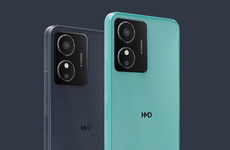
The Super-Slim HTC Desire 510 Boasts LTE Connectivity
Rahul Kalvapalle — August 27, 2014 — Tech
The HTC Desire 510 is the cheapest ever LTE handset produced by HTC. What makes this smartphone stand out over other low-cost offerings is the fact that it doesn't settle for 3G radios, instead plumping for LTE connectivity.
The phone is equipped with a quad core 1.2 GHz Snapdragon 410 processor, possibly the first 64-bit-capable chip in an Android smartphone. It has a display resolution of 854 x 480 on its 4.7-inch panel, essentially 208 pixels per inch.
The HTC Desire 510 is surprisingly slim and lightweight for such a low-cost device, weighing in at 158 grams and measuring less than 10 millimeters thick. It only offers 8 GB of on-board storage space, but its microSD card slot allows for storage expansion.
The device will be released in the UK in September for $247 before being rolled out in other markets.
The phone is equipped with a quad core 1.2 GHz Snapdragon 410 processor, possibly the first 64-bit-capable chip in an Android smartphone. It has a display resolution of 854 x 480 on its 4.7-inch panel, essentially 208 pixels per inch.
The HTC Desire 510 is surprisingly slim and lightweight for such a low-cost device, weighing in at 158 grams and measuring less than 10 millimeters thick. It only offers 8 GB of on-board storage space, but its microSD card slot allows for storage expansion.
The device will be released in the UK in September for $247 before being rolled out in other markets.
Trend Themes
1. Affordable LTE Smartphones - The market is shifting towards low-cost LTE-enabled smartphones that offer a competitive edge in terms of data speeds and connectivity.
2. 64-bit Processors in Budget Devices - The use of 64-bit processors in affordable smartphones is becoming more common, enabling faster processing speeds and improved performance even in budget devices.
3. Slim and Lightweight Budget Smartphones - Manufacturers are focusing on creating slim and lightweight smartphones at lower price points without compromising on quality and performance.
Industry Implications
1. Telecommunications - The telecommunications industry has a significant opportunity to tap into the growing demand for affordable LTE smartphones.
2. Consumer Electronics - The consumer electronics industry can explore the potential in producing 64-bit processors and chipset technologies for low-cost smartphones.
3. Mobile Network Operators - Mobile network operators can benefit from the rise in demand for cost-effective LTE devices as it can lead to a wider adoption of 4G networks.
1.3
Score
Popularity
Activity
Freshness























